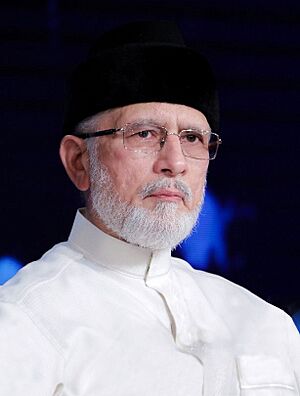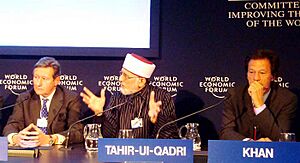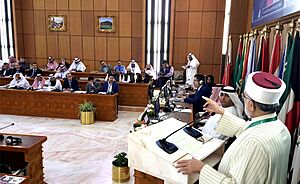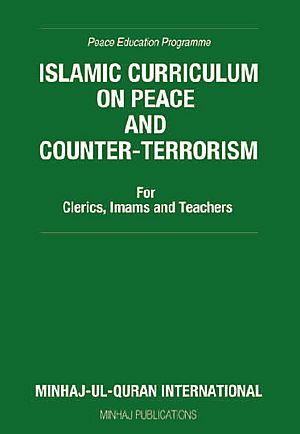Muhammad Tahir-ul-Qadri facts for kids
Quick facts for kids Muhammad Tahir-ul-Qadri |
|
|---|---|
| محمد طاہر القادری | |
 |
|
| Religion | Islam |
| Denomination | Sunni |
| Founder of | Minhaj-ul-Quran International, Pakistan Awami Tehreek |
| Philosophy | Sufism, Anti-Terrorism, Philanthropy |
| Alma mater | University of the Punjab |
| Personal | |
| Nationality | Pakistani |
| Born | 19 February 1951 Jhang, West Punjab, Pakistan |
| Senior posting | |
| Period in office | October 1981 – Present |
| Religious career | |
| Website | , |
| Scientific career | |
| Thesis | Punishment in Islam their Classification & Philosophy (1984) |
| Doctoral advisor | Bashir Ahmad Siddique |
Muhammad Tahir-ul-Qadri (Urdu: محمد طاہر القادری; born 19 February 1951) is a Pakistani–Canadian Islamic scholar and a former politician. He is known for starting two important organizations: Minhaj-ul-Quran International and Pakistan Awami Tehreek.
Born in West Punjab, Pakistan, Qadri has taught international constitutional law at the University of the Punjab. He also worked as a legal advisor on Islamic law for Pakistan's highest courts. He advised the Federal Ministry of Education on Islamic school subjects. Qadri has given over 6,000 lectures and written more than 1,000 books in Urdu, English, and Arabic. Over 450 of his books have been published. He has been listed in The 500 Most Influential Muslims every year since 2009. In 2012, he was nominated for the Nobel Peace Prize.
Contents
Early Life and Education
Muhammad Tahir-ul-Qadri was born on February 19, 1951. His family was Punjabi Muslim from the Jhang District in Punjab, Pakistan. He studied both regular subjects and Islamic teachings from a young age. He was a student of Tahir Allauddin Al-Qadri Al-Gillani.
He earned a high-level degree, a Master of Arts (MA) in Islamic Studies. He also got a Doctor of Philosophy (PhD) in Islamic Law from the University of Punjab. Later, he became a lecturer and then a professor of law at the same university.
Founding Minhaj-ul-Quran International
Minhaj-ul-Quran International is an organization that Qadri started on 17 October 1980. It now has branches in over a hundred countries.
The organization aims to promote peaceful religious understanding and good education. It also works to encourage dialogue and friendship between different faiths. Minhaj-ul-Quran International tries to explain Islam in a balanced way, using ideas from Sufism. In March 2011, the United Nations Economic and Social Council gave Minhaj-ul-Quran International a special role to advise them.
Political Journey
In May 1989, Muhammad Tahir-ul-Qadri started a political party called Pakistan Awami Tehreek (PAT). He won elections in 1990 and became a member of the National Assembly. However, on 29 November 2004, Qadri resigned from the National Assembly. He did this to protest the government's policies against terrorism, which he felt were too harsh. After this, in 2005, he moved to Canada.
Long March in 2012
In December 2012, after living in Toronto, Canada, for seven years, Qadri returned to Pakistan. He started a political campaign and called for a large march in Islamabad. The goal was to protest against government corruption. He demanded that an independent group be set up to make sure elections were fair. He also said he would reject the upcoming elections if these changes were not made.
On 14 January 2013, thousands of people marched in the city. They promised to stay in a sit-in protest until their demands were met.
When he started the march from Lahore, about 50,000 people joined him. He spoke to the crowd in front of the parliament building. After four days of protest, the government and Qadri signed an agreement. This agreement, called the Islamabad Long March Declaration, promised changes to elections and more openness in politics.
Some critics said the protests were a way for the Pakistan Armed Forces to delay elections. They also pointed to Qadri's connections with the military and his dual nationality.
Long March in 2014
On 17 June 2014, a violent clash happened between the Punjab Police and Pakistan Awami Tehreek activists. Several protesters died from police gunfire. Tahir-ul-Qadri said the police refused to record a formal complaint about the incident. An inquiry later found that police were involved in the events to remove barriers.
Tahir-ul-Qadri's flight was supposed to land in Islamabad. However, Pakistani authorities did not allow it, so the plane was sent to Lahore airport. Qadri was concerned about his safety. The Governor of Punjab personally escorted him to his home in Model Town, Lahore.
By the end of September 2014, the Inqilab March began. This involved sit-in protests in Islamabad, the capital of Pakistan. Qadri's party joined with Imran Khan, who was leading a similar protest.
Imran Khan and Tahir-ul-Qadri did not fully combine their marches but supported each other. On 10 August 2014, Qadri announced that his party's march would happen at the same time as Imran Khan's. Both marches took different but close routes. They had similar goals but different plans.
On 21 August 2014, Qadri said that the government was not letting his supporters bring food and water to the protesters.
A newspaper reported that hundreds of people were hurt as police clashed with protesters.
Then Prime Minister Nawaz Sharif asked General Raheel Sharif to help solve the situation. General Raheel Sharif met with Tahir-ul-Qadri and Imran Khan to end the sit-in. Because of this, a police report was finally recorded. Tahir-ul-Qadri thanked his supporters for their fight for justice.
It was reported that Tahir-ul-Qadri led the Eid prayer at Islamabad's D-Chowk. Imran Khan and other political leaders attended.
Key Events
Anti-Terrorism Camp
In August 2010, Qadri organized an anti-terrorism camp for young Muslims. It took place at the University of Warwick in the UK. The camp aimed to fight extremism. He set up the camp through Minhaj-ul-Quran UK.
World Economic Forum
In 2011, he spoke at the WEF meeting in Davos, Switzerland.
Lahore Public Gathering 2014
Seven days after a gathering in Faisalabad, Qadri held a public gathering in Lahore on 19 October 2014.
Model Town Incident 2014
The Model Town Incident, also known as the Lahore clash, was a violent event on 17 June 2014. It happened between the Punjab Police and Pakistan Awami Tehreek activists. Several protesters were killed by police gunfire. Five police officers were arrested. The standoff lasted almost 11 hours. Police tried to remove barriers from the road leading to the offices of Minhaj-ul-Quran and Qadri's home. PAT leaders had a court order allowing the barriers for security reasons, but police still acted.
The event was shown live on local news channels. Police said they were attacked first, but Qadri denied this. Live TV showed police firing weapons and tear gas, while protesters threw stones. Qadri strongly spoke out against the attack. He called it a terrible act of "state terrorism." Qadri promised to seek justice for the deaths of his workers.
Day of Martyrs
Qadri and his party marked Youm-e-Shuhada (Day of Martyrs) on 9 August 2014. It took place at the Minhaj ul Quran secretariat in Model Town. There were clashes between police and PAT workers across the country. After the gathering, he told his supporters that the rally on 10 August would be peaceful. He asked his followers to bring prayer mats for Quran recitation.
Other Appearances
Many organizations have invited him to give lectures.
In July 2011, he spoke about terrorism and integration at the Parliament of New South Wales in Sydney, Australia. He also appeared on Australian media to discuss Islam and terrorism. On 24 September 2011, Minhaj-ul-Quran held the "Peace for Humanity Conference" in London. Qadri and other speakers issued a declaration for peace. This conference was supported by leaders from different faiths, scholars, and politicians.
On 30 November 2011, Qadri gave a lecture at the "Peaceful Future of Afghanistan" conference in Istanbul, Turkey.
On 22 February 2012, Qadri visited Delhi, India, for a four-week tour. He shared a message of peace, saying: "Terrorism has no place in Islam." He also asked the Pakistani and Indian governments to spend less on defense. Instead, he urged them to use money to help poor people. He also visited Ajmer, where he gave a lecture on Sufism. On 4 January 2015, he stated that terrorism is the world's biggest problem.
Fatwa Against Terrorism
..... It is over 500 pages long in English. ..... This ruling directly challenges the ideas of groups like al-Qaeda and the Taliban. It is one of the most detailed Islamic rulings against terrorism. It strongly condemns terrorism without any excuses. It says that terrorism is a serious sin under Islamic law. The launch of this fatwa was organized by Minhaj-ul-Quran UK. Qadri said that "Terrorism is terrorism, violence is violence and it has no place in Islamic teaching."
The fatwa received a lot of attention from the media around the world.
According to CNN, experts believe the fatwa is a big setback for terrorist groups trying to recruit people. The US State Department called the fatwa an important step in taking Islam back from terrorists.
..... It includes a special certification from the Islamic Research Council of Al-Azhar, Egypt.
..... In January 2011, the fatwa was discussed at the World Economic Forum Annual Meeting. In June 2011, Pope Benedict XVI received a copy of the fatwa. The Pope reportedly liked that it promoted peace and understanding between different faiths.
Invitation to OIC
On 7 April 2019, Qadri spoke to scholars at the OIC meeting in Riyadh. He presented Minhaj-ul-Quran's plan for fighting terrorism through education.
His Views
One newspaper expert said that Qadri's legal and religious opinion in his fatwa on terrorism shows that there is a common understanding in Islam about certain extremist groups. Think Magazine (World Religions) mentioned Dr. Tahir ul Qadri as offering a different view of Islam compared to Osama Bin Laden. In November 2017, Mandla Mandela (the grandson of South African leader Nelson Mandela) visited Pakistan. He came at Tahir ul Qadri's invitation to attend a conference.
Writings
He has written 1000 works, and 550 of them are published books. This includes an "eight-volume, 7,000-page Qur’anic Encyclopaedia in English." He has given over 6000 lectures. He teaches subjects like Islamic law, beliefs, Sufism, philosophy, and history. His published works include:
- Islamic Concept of Crime (1985)
- Islamic Concept of Law (1987)
- Islam and Christianity (1999)
- Peace & Submission (2011)
- Muhammad the Merciful (2014)
- Islam on Mercy and Compassion (2014)
- Creation of Man - A Review of Qur'an and Modern Embryology (2017)
- Beseeching for Help (Istighathah) (2017)
See also
 In Spanish: Tahir ul Qadri para niños
In Spanish: Tahir ul Qadri para niños
- Minhaj-ul-Quran International
- The Amman Message
- Contemporary Islamic philosophy
- London Declaration for Global Peace and Resistance against Extremism 2011
- Minhaj Welfare Foundation
- Minhaj University




